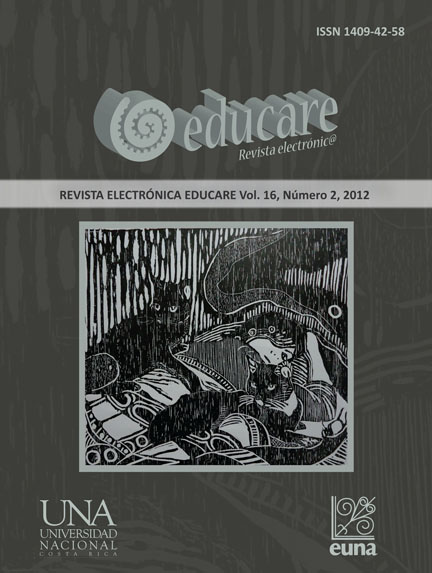Keys on the Formation and Human Development in Pedagogy
DOI:
https://doi.org/10.15359/ree.16-2.4Keywords:
Ethics, formation, education, hope, dialogue.Abstract
This paper is based on the experiences of the author, who has worked in the various levels of the Venezuelan educational system. This has been a very important platform to understand the ideas of education and human development within the Venezuelan institutionality in the educational field. The idea of education that we have, as teachers, should be rethought in order to consider the personal stories of those who share with us their time, interests and willingness: children, young people or adults, all with particular identities, differences and coincidences. The teachers, the schools and the State cannot consider an education for someone they do not know. In this sense, we provide some reflections resulting from our ethnographic work, based on the school life, interviews, class analysis, observations, and stories, among others. Our thoughts are classified as formation, hope, dialogue, attitude, and school life.
References
Díaz, P. J. (s. f.). Hermenéutica y Educación: Por una estrategia para la comprensión lectora no
reproductiva y la constitución de comunidades interpretativas. (Centro de Investigaciones
Contemporáneas UPEL-Maracay). Maracay, Venezuela: Editorial Corona.
Dilthey, W. (1978). Sección de obras de Filosofía. Obras de Dilthey. México: Fondo de Cultura
Económica.
Freire, P. (2004). Pedagogía de la autonomía. Sao Paulo: Paz e Terra.
Freire, P. (2000). Pedagogía de la indignación (3ª ed). Madrid: Morata.
Gadamer, H. G. (1977). Verdad y método. Fundamentos de una hermenéutica filosófica. Salamanca:
Sígueme.
Guber, R. (2001). La etnografía: Método, campo y reflexividad. Colombia: Grupo Editorial Norma.
Habermas, J. (2002). Teoría de la acción comunicativa (Volumen I). México: Taurus.
Heidegger, M. (1958). ¿Qué significa pensar? Buenos Aires, Argentina: Nova.
Hurtado, I. y Toro, J. (2007). Paradigmas y métodos de investigación en tiempos de cambio. Caracas:
Los libros de El nacional.
Husserl, E. (1992). Invitación a la fenomenología. España: Editorial Paidós.
Jares, X. (2005). Educar para la verdad y la esperanza (2a
ed.). España: Editorial Popular.
Knight, G. (2002). Filosofía y Educación. Colombia: APIA.
Lefebvre, H. (1983). La presencia y la ausencia. Contribución a la teoría de las representaciones.
México: Fondo de Cultura Económica
Mèlich, J-C. (2003). La sabiduría de lo incierto. Sobre ética y educación desde un punto de vista
literario. Educar, 31, 33-45.
Navarro S., J. (julio-septiembre, 2011). Editorial. Revista Educ@rnos, 1(2), 7-8. Recuperado de http://
revistaeducarnos.com/sites/default/files/educ@rnos2.pdf.
Neill, A. S. (1981). Corazones, no solo cabezas en la escuela (4a
ed). México: Editores Mexicanos
Unidos.
Pérez, A. (2005). Más y mejor educación para todos. Caracas, Venezuela: Editorial San Pablo.
Pérez, A. (2004). Educar para humanizar. Madrid: Nárcea ediciones.
Reyes, A. (2011). Filosofía de las religiones. Alemania: Lap Lambert & Editorial Académica Española.
Reyes, A. (2012). Teoría de la recreación: Claves para su resignificación (Tesis Doctoral). Universidad
Pedagógica Experimental Libertador, Instituto Pedagógico de Maturín. Maturín, Venezuela.
Ricoeur, P. (1999). Historia y narratividad. España: Editorial Paidos.
Savater, F. (2000). Ética para Amador (35ª ed). Bogotá, Colombia: Editorial Planeta Colombiana.
Savater, F. (1999). Las preguntas de la vida. Barcelona: Editorial Ariel.
Savater, F. (1998). Ética y ciudadanía. Caracas, Venezuela: Monte Ávila Editores.
Schiller, F. (1954). La educación estética del hombre. Madrid: Espasa Calpe.
Schleiermacher, F. (1997). Los discursos sobre hermenéutica. Cuadernos de Anuario Filosófico.
España: Universidad de Navarra.
Skliar, C. (2007). La educación (que es) del otro. Argumentos y desierto de argumentos pedagógicos.
Argentina: Noveduc.
Tamayo M. (1999). La investigación: Módulo 2. (3a
ed.). Bogotá, Colombia: Instituto Colombiano
para el fomento de la Educación Superior.
Touraine, A. (1996). ¿Podremos vivir juntos? Buenos Aires, Argentina: Fondo de Cultura Económica.
Downloads
Published
How to Cite
Issue
Section
License
1. In case the submitted paper is accepted for publication, the author(s) FREELY, COSTLESS, EXCLUSIVELY AND FOR AN INDEFINITE TERM transfer copyrights and patrimonial rights to Universidad Nacional (UNA, Costa Rica). For more details check the Originality Statement and Copyright Transfer Agreement
2. REUTILIZATION RIGHTS: UNA authorizes authors to use, for any purpose (among them selfarchiving or autoarchiving) and to publish in the Internet in any electronic site, the paper´'s final version, both approved and published (post print), as long as it is done with a non commercial purpose, does not generate derivates without previous consentment and recognizes both publisher's name and authorship.
3. The submission and possible publication of the paper in the Educare Electronic Journal is ruled by the Journal’s editorial policies, the institutional rules of Universidad Nacional and the laws of the Republic of Costa Rica. Additionally, any possible difference of opinion or future dispute shall be settled in accordance with the mechanisms of Alternative Dispute Resolution and the Costa Rican Jurisdiction.
4. In all cases, it is understood that the opinions issued are those of the authors and do not necessarily reflect the position and opinion of Educare, CIDE or Universidad Nacional, Costa Rica. It is also understood that, in the exercise of academic freedom, the authors have carried out a rogorous scientific-academic process of research, reflection and argumentation thar lays within the thematic scope of interest of the Journal.
5. The papers published by Educare Electronic Journal use a Creative Commons License:














 The articles published by Educare Electronic Journal can be shared with a Creative Commons License:
The articles published by Educare Electronic Journal can be shared with a Creative Commons License: 



